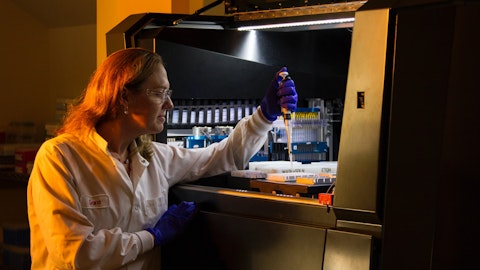In China, the government has been forcing down the price. Companies like Hengrui, who we’re working with, one of the largest companies in China, and others are getting the margins squeezed, so they’re looking for alternatives with insulin prices coming down in the U.S. and the pressure coming. And I think this whole thing is coming to the forefront. And in the meantime, while we’re focusing on these long-term extreme high value propositions in animal health and in alternative proteins and in industrial uses of Dapibus where we’re looking to generate revenues and profits in the meantime as we go along, and I think Joe can talk about more let’s see what the next question is about the FoodTech and the FoodTech conference. Maybe, Joe, you want to ask something about that or put some input about, where you’re going there and how things look.
Joe Hazelton: No. I think to your point, the conference we just attended in San Francisco, obviously, focusing on alternative proteins, that segment continues to heat up the investment dollars flowing. But the one key need that, that segment continues to have is, how do we commercialize the recombinant proteins that they have a clear need for large quantities of low-cost proteins? And food grade is going to continue to be an area where they’re going to need alternative production systems. And right now, we’ve got a lot of interest and a lot of traction in funding alternative ways to make these proteins. And I think that’s one area where, again, it’s a shorter development cycle and the shorter commercialization time line, which is something, obviously, we would be very, very interested in. So it’s one area that’s continuing to drive for us and we’ll continue to focus on and hopefully have news in the near term.
Operator: There are no other questions in the queue at this time. I’d like to hand the call back to management for closing remarks.
Mark Emalfarb: 2022 was a breakout year in several ways for Dyadic. The launch and further commercial development of the Dapibus platform has provided Dyadic a strong foundation and has already generated interest from companies in the alternative protein industry. Most importantly, we received regulatory approval and have already completed dosing in our first-in-human ever Phase 1 study for C1-produced protein. We believe this first-in-human safety data for C1-roduced protein in addition to the continued advances in productivity, quality and efficiency will help to accelerate the adoption of the C1 protein production platform within the human pharmaceutical industry to the benefit of patients across the globe. This was a significant undertaking for the Company and marks a new phase for Dyadic now that our C1 platform for recombinant protein vaccine is ready for commercialization.
We are not only focused on improving the value of Dyadic to the life science industry, which will in turn improve value for shareholders, but will also improve access to affordable vaccines and therapeutics globally. The reorganization of our infrastructure has enabled Dyadic to refine our focus and revise our strategy to exploit existing and new commercialization opportunities in the near term while enabling us to fulfill our mission as a global biotechnology company in order to improve the way we feed, fuel and heal the world. Thank you once again for joining us on today’s fiscal year 2022 conference call, and we look forward to keeping you updated as we advance our commercial and scientific initiatives across the companies and our collaborators’ programs.
We also look forward to seeing you on the next call, and I hope you all keep an eye out for our periodic updates.
Operator: Ladies and gentlemen, this does conclude today’s teleconference. Thank you for your participation. You may disconnect your lines at this time, and have a wonderful day.
Follow Dyadic International Inc (NASDAQ:DYAI)
Follow Dyadic International Inc (NASDAQ:DYAI)
Receive real-time insider trading and news alerts





